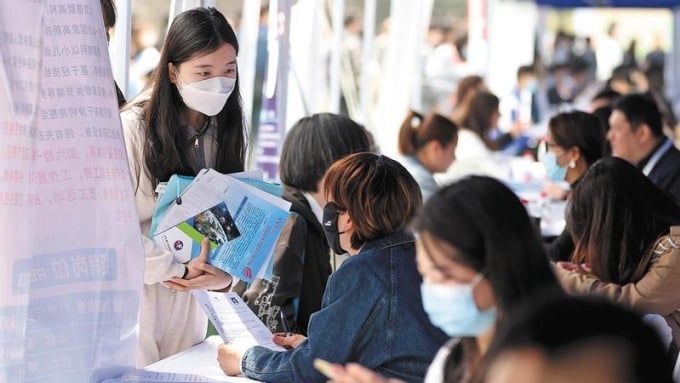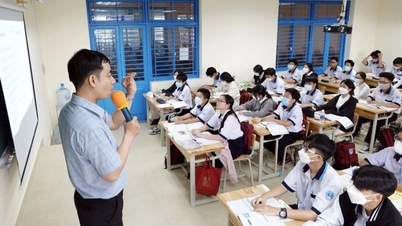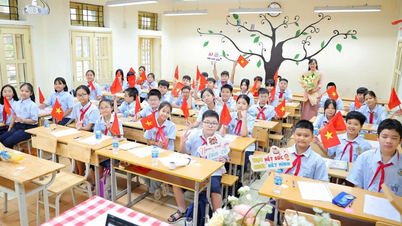China Graduated with a degree in Applied Mathematics but Liang Huaxiao could not find a job, had to work as a waiter in a bakery and a beauty salon.
Before that, Liang, 25, spent two years applying for jobs at technology companies in China. Then, she switched to sales and customer service, but the results were not positive. Finally, Liang worked as a maid at a bakery and a beauty salon to earn money.
"Finding a job was really difficult. My mother cried when she found out I was going to do manual labor," Liang said, choking up.
Wang, 23, a programming graduate, earns less than $420 a month as a part-time food delivery worker in Jining city, eastern China.
"The entry requirements of the programming industry are constantly increasing. I couldn't find a position in a big tech company, while small companies don't pay overtime," Wang said.

Students at a job fair in Beijing on April 28. Photo: Chinadaily
China’s youth job market is said to be in crisis. The impact of Covid-19 has hit students in popular fields such as technology, education, real estate and finance hard. Economists predict that more college graduates like Liang will be unemployed.
In February, a survey in China showed that the unemployment rate for people aged 16-24 was 18.1%, the highest since August last year. The figure hit a new record of 20.4% in April, according to Reuters. Meanwhile, 11.6 million university students graduated this summer, up 820,000 from 2022.
According to SCMP, a recent graduate had to compete with 50 other candidates to win a job at a small company in Beijing. Xu Beibei, an artist at an online game company, said the team had recruited only four people, but received 200 applications.
While college students are struggling to find jobs, many industries are still in need of workers. Manufacturing companies are short of engineers and skilled workers, while the current workforce in factories is aging. Ninety-five percent of students studying vocational courses like welding and plumbing in a February survey said they had no trouble finding work.
Keyu Jin, author of "The New China Playbook," which chronicles the country's economic development, said: "China's education is ahead of its economy, meaning there are more degrees than are needed in a manufacturing-based economy."
Because they could not find the jobs they wanted, some students put away their university degrees to return home to start their own businesses.
“Young people no longer believe that one’s worth comes from studying hard or being successful in their career,” said Han Zhaoxue, 26, a graduate with a master’s degree in public administration who now runs a homestay in the countryside after turning down low-paying offers.
Wang also decided to return to his hometown to study for the civil service exam. Meanwhile, Liang remained unemployed and was seriously considering becoming a street vendor.
“I can’t think of any other industry I haven’t applied to,” Liang said.
Doan Hung (According to Reuters, SCMP)
Source link


![[Photo] Panorama of the cable-stayed bridge, the final bottleneck of the Ben Luc-Long Thanh expressway](https://vphoto.vietnam.vn/thumb/1200x675/vietnam/resource/IMAGE/2025/9/30/391fdf21025541d6b2f092e49a17243f)

![[Photo] Solemn opening of the 12th Military Party Congress for the 2025-2030 term](https://vphoto.vietnam.vn/thumb/1200x675/vietnam/resource/IMAGE/2025/9/30/2cd383b3130d41a1a4b5ace0d5eb989d)
![[Photo] The 1st Congress of Phu Tho Provincial Party Committee, term 2025-2030](https://vphoto.vietnam.vn/thumb/1200x675/vietnam/resource/IMAGE/2025/9/30/1507da06216649bba8a1ce6251816820)
![[Photo] President Luong Cuong receives President of the Cuban National Assembly Esteban Lazo Hernandez](https://vphoto.vietnam.vn/thumb/1200x675/vietnam/resource/IMAGE/2025/9/30/4d38932911c24f6ea1936252bd5427fa)
![[Photo] General Secretary To Lam, Secretary of the Central Military Commission attends the 12th Party Congress of the Army](https://vphoto.vietnam.vn/thumb/1200x675/vietnam/resource/IMAGE/2025/9/30/9b63aaa37ddb472ead84e3870a8ae825)
































































































Comment (0)